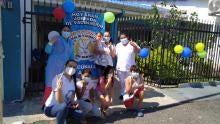Development of an agenda for research and action on climate change and health in the Caribbean
This paper delineates the development of the Caribbean Research for Action Agenda which aims to empower Caribbean Small Island Developing States to reduce their vulnerabilities to the effects of climate change on health. The Caribbean Research for Action Agenda emerged from collaboration between nongovernmental organizations, academic institutions, and multilateral agencies that organized a conference on climate change and health in the Caribbean.















